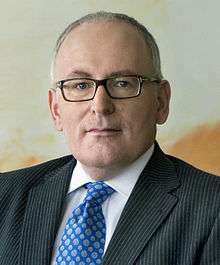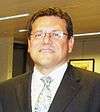Party of European Socialists
Party of European Socialists | |
|---|---|
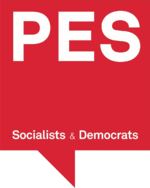 | |
| President | Sergei Stanishev (BG) |
| Secretary-General | Achim Post (DE) |
| Founded |
1973 (Confederation) 9–10 November 1992 (Party) |
| Headquarters | Rue Guimard 10, 1040 Brussels, Belgium |
| Think tank | Foundation for European Progressive Studies |
| Youth wing | Young European Socialists |
| Women's wing | PES Women |
| Ideology |
Social democracy[1][2] Pro-Europeanism |
| Political position | Centre-left[2] |
| International affiliation |
Progressive Alliance, Socialist International |
| European Parliament group | Progressive Alliance of Socialists and Democrats |
| Colours | Red |
| European Parliament |
191 / 751 |
| European Council |
9 / 28 |
| European Commission |
8 / 28 |
| Website | |
| www.pes.eu | |
The Party of European Socialists (PES) is a social-democratic European political party.[3] The PES comprises national-level political parties primarily from member states of the European Union (EU) and other nations of the European continent. The PES member parties are themselves mostly members of the Progressive Alliance or Socialist International. The political group in the European Parliament of the PES is the Progressive Alliance of Socialists and Democrats (S&D). The PES also operates in the Committee of the Regions (in the PES Group in the Committee of the Regions) and the European Council. The PES is currently led by Sergei Stanishev, former Prime Minister of Bulgaria.
The PES includes major parties such as the Italian Democratic Party (PD), the British Labour Party, French Socialist Party (PS), Social Democratic Party of Germany (SPD), Spanish Socialist Workers' Party (PSOE) and also has member parties in all EU states.
Name
The party's English name is "Party of European Socialists". In addition, the following names are used in other languages:
- Albanian: Partia e Socialistëve Europianë
- Bosnian: Partija europskih socijalista
- Bulgarian: Партия на европейските социалисти
- Croatian: Stranka europskih socijalista
- Czech: Strana evropských socialistů
- Danish: De Europæiske Socialdemokrater
- Dutch: Partij van de Europese Sociaaldemocraten
- Estonian: Euroopa Sotsialistlik Partei
- Finnish: Euroopan sosialidemokraattinen puolue
- French: Parti socialiste européen
- German: Sozialdemokratische Partei Europas
- Greek: Ευρωπαϊκό Σοσιαλιστικό Κόμμα
- Hungarian: Európai Szocialisták Pártja
- Icelandic: Flokkur evrópskra sósíalista
- Irish: Páirtí na Sóisialaithe Eorpach
- Italian: Partito del Socialismo Europeo
- Maltese: Partit tas-Soċjalisti Ewropej
- Latvian: Eiropas Sociāldemokrātiskā partija
- Lithuanian: Europos socialistų partija
- Macedonian: Партија на европските социјалисти
- Norwegian: Det europeiske sosialdemokratiske partiet
- Polish: Partia Europejskich Socjalistów
- Portuguese: Partido Socialista Europeu
- Romanian: Partidul Socialiștilor Europeni
- Serbian: Партија европских социјалиста
- Slovak: Strana európskych socialistov
- Slovene: Stranka evropskih socialistov
- Spanish: Partido Socialista Europeo
- Swedish: Europeiska socialdemokratiska partiet
- Turkish: Avrupa Sosyalistler Partisi
In March 2014 following the congress in Rome, the PES added the tagline "Socialists and Democrats" to its name following the admission of Italy's Democratic Party into the organisation.[4]
History
1960s
In 1961, the Socialists in the European Parliament attempted to produce a common European Socialist Programme but were neglected due to the applications of Britain, Denmark, Ireland and Norway to join the European Communities. The Socialist's 1962 congress pushed for greater democratisation and powers for Parliament though it was only in 1969 that this possibility was examined by the member states.[5]
1970s
In 1973, Denmark, Ireland and the United Kingdom joined the European Community bringing in new parties from these countries. The enlarged Socialist Congress met in Bonn and inaugurated the Confederation of the Socialist Parties of the European Community. The Congress also passed a resolution on social policy, including the right to decent work, social security, democracy and equality in the European economy.[6] In 1978, the Confederation of Socialist Parties approved the first common European election Manifesto. It focused on several goals among which the most important were to ensure a right to decent work, fight pollution, end discrimination, protect the consumer and promote peace, human rights and civil liberties.
1980s
The Luxembourg Congress approved the first Statue of the Confederation of Socialist Parties in 1980. The accession of Greece in 1981, followed by Spain and Portugal in 1986 brought in more parties. In 1984 another common Socialist election manifesto was approved at a congress in Luxembourg. The Manifesto proposed a socialist remedy for the economic crisis by establishing a link between industrial production, protection of the fundamental social benefits and the fight for an improved quality of life.[6]
1990s
In 1992, with the European Communities becoming the European Union and with the Treaty of Maastricht establishing the framework for political parties at the European Level, the Confederation was able to mobilize a majority of delegates in favour of transforming the Confederation into the Party of European Socialists. The first programme of the party concentrated on job creation, democracy, gender equality, environmental and consumer protection, peace and security, regulation of immigration, discouragement of racism and fighting organised crime.[6]
Along with the Socialist Group in the European Parliament, the founding members of the PES were the Social Democratic Party of Austria, the Socialist Party (Francophone) and the Socialist Party (Flemish) of Belgium, the Social Democrats of Denmark, the Socialist Party of France, the Social Democratic Party of Germany, the Panhellenic Socialist Movement of Greece, the Labour Party of Ireland, the Italian Democratic Socialist Party, Italian Socialist Party and Democratic Party of the Left of Italy, the Luxembourg Socialist Workers' Party, the Labour Party of the Netherlands, Socialist Party of Portugal, the Spanish Socialist Workers' Party, Swedish Social Democratic Party and the Labour Party and Social Democratic and Labour Party of the UK.[7]
2000s
In 2004 Poul Nyrup Rasmussen defeated Giuliano Amato to be elected President of the PES, succeeding Robin Cook in the post. He was re-elected for a further 2.5 years at the PES Congress in Porto on 8 December 2006 and for another 2.5 years at the Prague Congress in 2009.
In 2010, the Foundation for European Progressive Studies was founded as the political foundation of the PES.
He resigned at the PES Progressive Convention of Brussels on 24 November 2011, and was replaced by Sergei Dmitrievich Stanishev, chairman of the Bulgarian Socialist Party (BSP), elected PES Interim President, by acclamation, by the PES Presidency.
On the same day, the PES Council made the decision that the next PES candidate for Commission President would be democratically elected through a PES presidential primary taking place in January 2014.
Brussels Congress, 28–29 September 2012
The Party of European Socialists held its latest Congress in Brussels on 28–29 September 2012.[8] These congresses are organized every two and a half years,[9] once during the year of the elections for the European Parliament, and once at mid-term. The latest Congress elected Sergei Stanishev as PES President, as well as four deputies: Jean-Christophe Cambadélis (1st Vice-President – PS), Elena Valenciano (PSOE), Jan Royall (Labour) and Katarina Nevedalova (Smer-SD) and prepared the 2014 European elections. The same Congress elected Achim Post (SPD) as new Secretary General.
The congress also adopted a process presented by the PES as more democratic and transparent[10] for the selection of their candidate for the Presidency of the European Commission in 2014.
Presidents
Presidents of the Party of European Socialists and its predecessors.[11]
| President | State | National party | Term | ||
|---|---|---|---|---|---|
| 1. | Wilhelm Dröscher | Social Democratic Party of Germany | April 1974 | January 1979 | |
| 2. | Robert Pontillon | Socialist Party | January 1979 | March 1980 | |
| 3. | Joop den Uyl | Labour Party | March 1980 | May 1987 | |
| 4. | Vítor Constâncio | Socialist Party | May 1987 | January 1989 | |
| 5. | Guy Spitaels | Socialist Party | February 1989 | May 1992 | |
| 6. | Willy Claes | Socialist Party | November 1992 | October 1994 | |
| 7. | Rudolf Scharping | Social Democratic Party of Germany | March 1995 | May 2001 | |
| 8. | Robin Cook | Labour Party | May 2001 | 24 April 2004 | |
| 9. | Poul Nyrup Rasmussen | Social Democrats | 24 April 2004 | 24 November 2011 | |
| 10. | Sergei Stanishev | Bulgarian Socialist Party | 24 November 2011 | – | |
Organisation
| Social democracy |
|---|
 |
|
Development |
|
People |
|
There are thirty-three full member parties from all the twenty-eight member states and Norway. There are a further thirteen associate and twelve observer parties.[12] PES is an associated organisation of the Socialist International. Young European Socialists is the youth organisation of PES and PES Women is the party's women's organisation, led by Zita Gurmai.[13]
The parties meet at the party Congress twice every five years to decide on political orientation, such as adopting manifestos ahead of elections. Every year that the Congress does not meet, the Council (a quarter Congress) shapes PES policy. The Congress also elects the party's President, Vice Presidents and the Presidency.[13]
The President (currently former Prime Minister of Bulgaria Sergei Stanishev) represents the party on a daily basis and chairs the Presidency, which also consists of the Secretary General, President of the S&D group in Parliament and one representative per full/associate member party and organisation. They may also be joined by the President of the European Parliament (if a PES member), a PES European Commissioner and a representative from associate parties and organisations.[13]
The Leader's Conference brings together Prime Ministers and Party Leaders from PES parties three to four times a year to agree strategies and resolutions.[13]
In December 2009, the PES decided to put forward a candidate for Commission President at all subsequent elections.[14] On the 1st of March, 2014, the PES organised for the first time a European election Congress where a Common Manifesto [15] was adopted and the Common Candidate designate for the post of Commission President, Martin Schulz, was elected by over a thousand participants in Rome, Italy. PES member parties across Europe joined forces to campaign for the European elections, and a mass grassroots movement sprang up in support of Martin Schulz, aiming to ‘knock the vote’ in support of his candidacy.
PES in the European institutions
Overview of the European institutions
| Organisation | Institution | Number of seats |
|---|---|---|
| | European Parliament | 191 / 751 |
| | Committee of the Regions | 131 / 350 |
| | European Commission | 8 / 28 |
| | European Council (Heads of Government) | 9 / 28 |
| | Council of the European Union (Participation in Government) | 19 / 28 |
| | Parliamentary Assembly | 69 / 318 |
European Parliament
European Commission
European Commissioners are meant to remain independent, however there has been an increasing degree of politicisation within the Commission.[16] In the current European Commission, eight of the Commissioners belong to the PES family.
European Council
The PES has eight out of the 28 heads of State or Government that attend the PES summits in preparation for the European Council:
| Member State | Representative | Title | Political party | Member of the Council since | Photo |
|---|---|---|---|---|---|
.jpg) | |||||
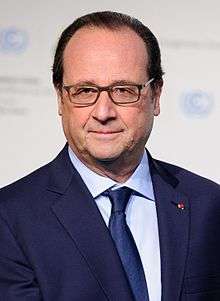 | |||||
 | |||||
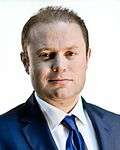 | |||||
.jpg) | |||||
.jpg) | |||||
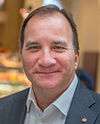 |
European Council and Council of Ministers
.png)
Does not account for coalitions. Key to colours is as follows;
Party-alignment at the European Council is often loose, but has been the basis of some intergovernmental cooperation. At present eight countries are led by a PES-affiliated leader, who represents that state at the European Council: Austria (Christian Kern), the Czech Republic (Bohuslav Sobotka), France (François Hollande), Italy (Matteo Renzi), Lithuania (Algirdas Butkevičius), Malta (Joseph Muscat), Slovakia (Robert Fico), and Sweden (Stefan Löfven).
The makeup of national delegations to the Council of Ministers is at some times subject to coalitions: for the above governments led by a PES party, that party may not be present in all Council configurations; in other governments led by non-PES parties a PES minister may be its representative for certain portfolios. PES is in coalition in a further seven countries: Finland, Germany, Greece, Ireland, Luxembourg, The Netherlands and Slovenia.
Overview
Parliamentary Assembly of the Council of Europe
Committee of the Regions
PES has 122 members in the Committee of the Regions as of 2014.[17]
Member parties
It has 33 full members from 27 of the 28 EU states plus Norway, although not all of them have elected MEPs.[18]
References
- ↑ Parties and Elections in Europe: The database about parliamentary elections and political parties in Europe, by Wolfram Nordsieck
- 1 2 Richard Dunphy (2004). Contesting Capitalism?: Left Parties and European Integration. Manchester University Press. p. 103. ISBN 978-0-7190-6804-1.
- ↑ Robert Thomson (2011). Resolving Controversy in the European Union: Legislative Decision-Making Before and After Enlargement. Cambridge University Press. p. 14. ISBN 978-1-139-50517-8. Retrieved 9 August 2013.
- ↑ "Il PSE "omaggia "il PD cambiando ufficialmente nome: PSE - Socialists&Democrats." (in Italian). 2014-03-02. Retrieved 2016-09-20.
- ↑ "Northern European Social Democracy and European Integration, 1960-1972. Moving towards a New Consensus?". Academia.edu. Retrieved 23 May 2013.
- 1 2 3 "History". Socialist Group website. Retrieved 11 November 2007.
- ↑ Skrzypek, Ania (2013). “Europe, Our Common Future” Celebrating 20 years of the Party of European Socialists (PDF). Belgium: FEPS – Foundation for European Progressive Studies. ISBN 978-3-85464-037-0.
- ↑ "Together for the Europe we need!". Zita Gurmai, President of PES Woman. 26 July 2012. Retrieved 8 August 2012.
- ↑ "PES Statutes adopted by the 8th Congress" (PDF). PES. December 2009. Retrieved 8 August 2012.
- ↑ "Ethics in politics : For strong moral conduct through a strong moral code" (PDF). PES Presidency declaration. 14 April 2011. Retrieved 8 August 2012.
- ↑ "Former PES Presidents". PES website. Archived from the original on 9 October 2007. Retrieved 21 January 2008.
- ↑ "About the PES?". PES website. Retrieved 14 September 2016.
- 1 2 3 4 "How does PES work?". PES website. Archived from the original on 30 October 2007. Retrieved 7 November 2007.
- ↑ "A New Direction for Progressive Societies. Resolution N. 2 A new way forward. Adopted by the 8th PES Congress" (PDF). PES. 8 December 2009. Retrieved 17 October 2010.
- ↑ "PES Manifesto Towards a New Europe. Adopted by Election Congress 2014 in Rome" (PDF). PES. 1 March 2014. Retrieved 1 March 2014.
- ↑ Mahony, Honor (7 May 2007). "Brussels struggles with communication policy.". EU Observer. Retrieved 12 May 2007.
- ↑ "PES Group Members". Retrieved 2015-01-13.
- ↑ "Your party". PES. Retrieved 21 June 2015.
External links
| Wikimedia Commons has media related to Party of European Socialists. |
- Party of European Socialists, official website
- Parliamentary Group of the Party of European Socialists, official website
- European Youth Guarantee campaign, official website
- PES Group in the Committee of the Regions, official website
